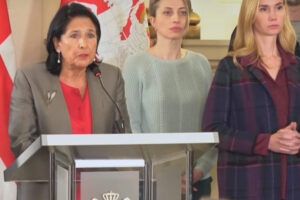Former French-Georgian president Salome Zourabichvili says she is the rightful president (capture Euronews) French-Georgian ex-president Salome Zourabichvili says she is the legitimate president (capture Euronews)
Former footballer Mikheïl Kavelashvili, now a figure of the Georgian far right, was sworn in on Sunday December 29, while the outgoing president, Salomé Zourabichvili, a French-Georgian, clung to her seat. In Romania, the election was canceled.
Pro-Russian positions
Mikheïl Kavelashvili’s accession to the presidency of Georgia took place this morning in an electric atmosphere. Several thousand demonstrators gathered at dawn outside the presidential palace to protest against the inauguration. Close to the Georgian Dream party currently in power, the new president has come in for fierce criticism, not least because of his party’s pro-Russian and anti-Western stance.
Contested legitimacy
The handover of power was marked by a spectacular event: the departure of the outgoing president, Salome Zourabichvili, who left the presidential palace declaring that she maintained her legitimacy. “I remain the only legitimate president of Georgia”, she told her supporters, promising to continue her political battle.
A controversial electoral process
Kavelashvili’s election on October 14 took place under an indirect voting system boycotted by the opposition. Half of the electoral college that nominated him was made up of members of parliament whose legitimacy is itself in dispute, following the October parliamentary elections which the opposition regards as rigged.
Although the powers of the Georgian president are essentially symbolic, this political crisis illustrates the deep divisions that run through the country, particularly on the question of relations with Russia and Georgia’s geopolitical orientation.
Election canceled in Romania
Romania is plunged into a major political crisis following the cancellation of the first round of the presidential election in favor of pro-Russian candidate Calin Georgescu (23% of the vote). The Romanian Constitutional Court invalidated the entire electoral process on Friday December 6, 2024, suspecting foreign influence. There are, however, many who argue that Georgescu democratically came out on top in the first round of the election. In any case, the annulment of the election has triggered a debate on the role of the Constitutional Court. Former Constitutional Court judge Petre Lăzăroiu explains that the court’s role is to validate results on the basis of clear evidence, not suspicion.
So, foreign interference and manipulation of votes, or cancellation of a vote because it’s inconvenient, as was the case in France for the May 29, 2005 referendum on the European Constitutional Treaty? If democracy is blurred to such an extent by our elected representatives and institutions, it’s because our elites are completely corrupt.
What is happening in Georgia and Romania is extremely serious.
From now on, when the result of an election displeases Brussels, it refuses it.
Respecting people’s choices today means protecting ours tomorrow.
EU diktats are becoming more and more intolerable. ENOUGH! pic.twitter.com/vbYK9vHHtj— Thierry MARIANI (@ThierryMARIANI) December 18, 2024
It is therefore confirmed that the crime perpetrated against democracy in Romania was a German maneuver involving Klaus Iohannis (the now illegitimate German-speaking President), Ursula Von der Leyen, and Steinmeier:
They allowed themselves to cancel a presidential election!!!! https://t.co/HEBSKcMIrz— herve hannoun (@HerveHannoun) December 27, 2024
The article After Romania, Georgia: An investiture under high tension appeared first on FrenchDailyNews.
